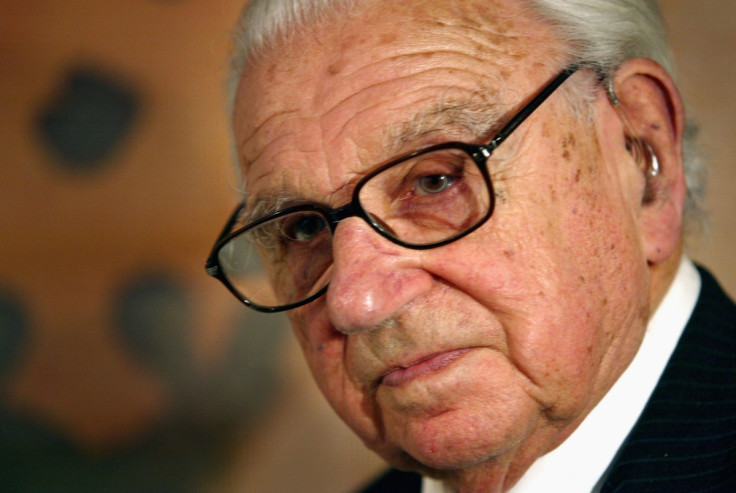Holocaust Memorial Day: Britain had its own Schindler
More than 6,000 people are alive today thanks to one unassuming man.

Who would imagine a BBC1 show famed for reporting on dogs that can say "sausages" and vegetables that look like thingies would broadcast the most moving moment in television history. But that's precisely what That's Life! – The One Show of its day – managed to achieve one Sunday evening back in February 1988.
Between reports on a knobbly knees competition and a piano-playing budgerigar (probably), presenter Esther Rantzen produced a scrapbook belonging to someone in the audience.
It contained details of 669 mostly Jewish children from Nazi-occupied Czechoslovakia, who were given safe passage to Britain just before the war. Most of these youngsters would never see their parents again – the fathers and mothers they waved behind murdered during the Holocaust. But these children escaped and survived. And the man who saved them, Nicholas Winton, was sitting in the front row.
Beside him was Vera Diamond [now Vera Gissing], a 10-year-old girl Winton put on a train out of Prague in June 1939. Together again, half a century later, they tearfully embraced – a moving climax to a memorable reunion.
But it wasn't over yet. Far from it, as Rantzen asked: "Is there anyone else in the studio tonight who owes their life to Nicholas Winton? If so, could you stand up..."
After a dramatic pause, as if one were need, HALF the audience – perhaps 50 people – stood up, along with the hairs on the necks of every viewer.
This was an audience that had cheated death. This was an audience who as infants were marked for Auschwitz, Belsen or Theresienstadt. These were the mothers, fathers and grandparents of more than 6,000 people alive today thanks to the unassuming man in the front row, looking slightly embarrassed by all the fuss. It was an emotional, exceptional moment – followed, when the tears had finally dried, by a showjumping sheep and a goat with a bus pass.
Some 27 years later, on 1 July 2015, I was about to send another edition of Jewish News to the printers when word came that the great man, now Sir Nicholas, had died, aged 106. We spent the night rewriting the newspaper and ran the simple headline "Our Hero".
A year before his death, Winton had travelled to Prague to receive the Czech Republic's highest honour, the Order of the White Lion. In his speech, he said: "In a way, I shouldn't have lived so long to give everyone the opportunity to exaggerate things the way they are doing today."
In those times there was darkness everywhere. In Heaven and on Earth, all the gates of compassion seemed to have been closed. The killer killed and the Jews died and the outside world adopted an attitude either of complicity or of indifference. Only a few had the courage to care
But Winton had organised eight evacuations of the children, advertised in newspapers for foster homes, got permits from the immigration office in the UK and persuaded the Germans to let the children leave the country.
In the days that followed the announcement of Winton's death, we wondered how to make a lasting tribute to his legacy. Weeks later, in partnership with the Holocaust Educational Trust (HET), Jewish News launched a petition, which was signed by 106,000 people, that called on the the Royal Mail to produce a commemorative stamp in his honour. A decision usually takes two years. The Royal Mail took two months. The stamp will be issued in March.
Following our joint campaign, HET gave me the honour of interviewing two prominent public figures at the Labour and Conservative party conferences, who both owe their lives to Winton – Labour Party grandee Lord Dubs, who was six when he boarded a train in Prague and Lady Milena, who was nine.
Nobel Peace Prize recipient and Holocaust survivor Elie Wiesel, once said: "In those times there was darkness everywhere. In Heaven and on Earth, all the gates of compassion seemed to have been closed. The killer killed and the Jews died and the outside world adopted an attitude either of complicity or of indifference. Only a few had the courage to care."
If Winton leaves us with one lesson to pass to future generations, it's surely the simple, powerful theme of this year's Holocaust Memorial Day, which we commemorate today. Three words the great man lived his life by: "Don't stand by."
Richard Ferrer has been the editor of the Jewish News since 2009.
© Copyright IBTimes 2025. All rights reserved.






















